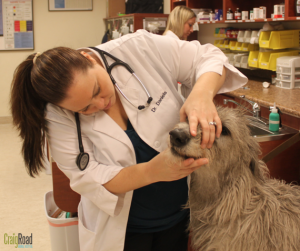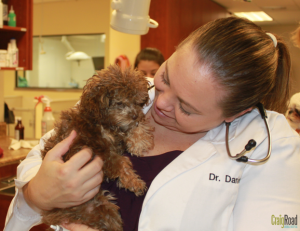
Courtney Daniels, DVM
Veterinarian Courtney Daniels D.V.M. of Craig Road Animal Hospital in North West Las Vegas discusses the importance of a yearly exam for your pet by a professional. Wellness exams are one of the few ways to help detect a problem before it becomes a serious illness.
By Courtney Daniels, DVM
We all love our pets, and we all want to do what’s best to take care of them. A wellness exam allows a veterinarian to evaluate your pet’s overall health and can detect a problem before it turns into a serious illness. Dogs and cats do not have the gift of speech, so they cannot verbally tell you what is wrong. Having a thorough examination on your pet plays an important role in keeping them happy and healthy. A thorough wellness exam can include a physical exam, vaccinations, blood tests, urinalysis, and a parasite screening. Depending on the results, your veterinarian may recommend further diagnostic testing. This may include radiographs (X-rays) and additional blood tests. We recommend having your pet examined at least once a year.

Dr. Daniels performing a wellness exam.
Senior pets and those experiencing chronic health issues should have a wellness exam more frequently. Your veterinarian will start by asking you questions regarding your pet’s health history. They will then follow up with your pet’s diet, how much water they are consuming, and their daily behavioral patterns. It is very important to mention any unusual behavior including:
excessive urination
excessive drinking of water
excessive panting
eating more or less than usual
vomiting
diarrhea
excessive scratching
coughing
weight gain
difficulty walking, running, or getting up in the morning
Your veterinarian will go over your pet’s potential exposure to fleas, ticks, heartworms, and intestinal parasites. Depending on your pet’s age, breed, life style, where you live and other factors, your veterinarian will recommend screening tests. During the exam your pet’s eyes, ears, skin, joints, reproductive systems, weight, heart, lungs, mouth and teeth will all be carefully examined. A vaccination schedule will be tailored for your pet. Core vaccinations for dogs include canine distemper virus, parvovirus, adenovirus, hepatitis, and rabies. Core vaccinations for cats include feline panleukopenia (distemper), feline herpesvirus, calicivirus, and rabies. Other vaccinations will be recommended based on lifestyle, geographic location, or travel history, breed and age.

Falling in love with a new client!
A wellness exam is one of the simplest ways to detect and prevent major health issues from puppies and kittens to senior pets. Having a veterinarian examine your pet once a year or more means that you are helping them live a longer and healthier life.

